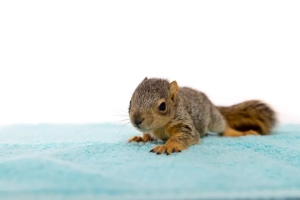Column: Busting myths about urban wildlife at ‘Wildlife Day’ on Oct. 8

An orphaned baby squirrel is rehabilitated at Pasadena Humane’s Sandra J. Goodspeed Wildlife Center. Learn more about wild animals at Pasadena Humane’s Wildlife Day event on Oct. 8. This free, family-friendly event will include educational wildlife talks, a marketplace with wildlife-themed goodies, an interactive craft space for kids and ambassador animals from local wildlife organizations. (Photo courtesy of Pasadena Humane/Best Friends Animal Society)
It’s amazing to see collaboration, one of our core values at Pasadena Humane, in action throughout our organization every day.
We see collaboration both in teamwork between the 140 employees and 1,000 volunteers within our organization, as well as in our many community partnerships.
I’d like to highlight a special event this weekend where we will be collaborating with other animal welfare organizations in our efforts to promote peaceful coexistence with wildlife.
We will host “Wildlife Day” at Pasadena Humane, from 11 a.m. to 2 p.m. Sunday, Oct. 8. Our educational partners for this free, all-ages event include KidSpace, International Bird Rescue, Pasadena Audubon Society and the Southwest Herpetological Society.
The event will include a vendor marketplace with wildlife-themed items, an interactive craft area for children, presentations on coyote safety and other topics and “ambassador” animals from a variety of local wildlife organizations.
We share our backyards, streets and hillsides with a wide variety of wild birds, mammals and reptiles. But, how well do we know them?
I asked Lauren Hamlett, Pasadena Humane’s Director of Wildlife Education and Services, to help us bust some common myths about local wildlife.
Myth 1: Rabies is prevalent among all wild animals.
Fact: In general, rabies is quite rare among wild animals in our area. In Los Angeles County, bats are the primary carrier of rabies. If you see a bat on the ground or during the day, DO NOT touch them. Instead, call or text our wildlife helpline at 626.344.1129.
Myth 2: That coyote was stalking me!
Fact: It’s possible, but they may be “escorting” you instead. Escorting is when a coyote follows you (and your pet) to ensure you are not a threat and to keep you away from any pups, den or other sensitive areas. A curious coyote may also stop and watch you to assess if you are a threat to their family.
Myth 3: Skunks spray all the time.
Fact: Skunks only spray when they feel threatened, startled or are cornered. They typically show many warning signs before spraying, such as stomping their feet, sticking their tail straight up and showing their behinds.
Myth 4: That’s a rattlesnake!
Fact: Rattlesnakes and gopher snakes look very similar, but gopher snakes are non-venomous and pose no serious threat to people or pets. The gopher snake is longer, and its body is slender and whip-like compared to a rattlesnake’s heavy-bodied, broad appearance. Also, rattlesnakes have a flat, triangular head compared to a gopher snake’s narrow, rounded one.
Myth 5: A bird on the ground that can’t fly must be injured.
Fact: If you don’t see any obvious signs of illness or injury, it’s probably just a fledgling, aka a young bird, learning to fly. Most birds learn to fly from the ground. This process often takes a few weeks. During this time, parents still care for fledglings, so they do not need human intervention.
Myth 6: If a bear is relocated, that will keep the bear out of my yard.
Fact: Relocated bears will often find their way back. Bears have great long-term memories, especially when it comes to where they have found food in the past.
Their presence at your home likely means they’ve found a good food source, such as birdseed, unsecured garbage or pet food. The best way to keep the bears away is to eliminate the food sources.
Are you interested in learning more about local wildlife? Please stop by “Wildlife Day” this Sunday at 361 S. Raymond Ave., Pasadena. Learn more about the event and RSVP at pasadenahumane.org/wildlifeday
Dia DuVernet is president and CEO of Pasadena Humane.
This blog post originally appeared as a column in the Pasadena Star-News on October 6, 2023.


